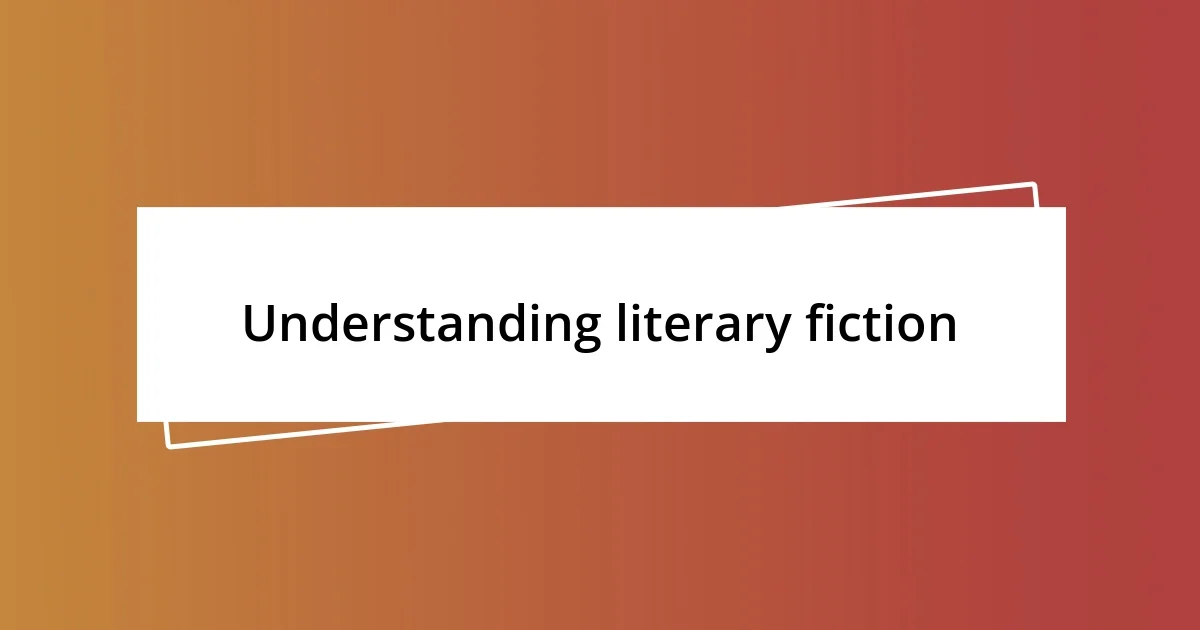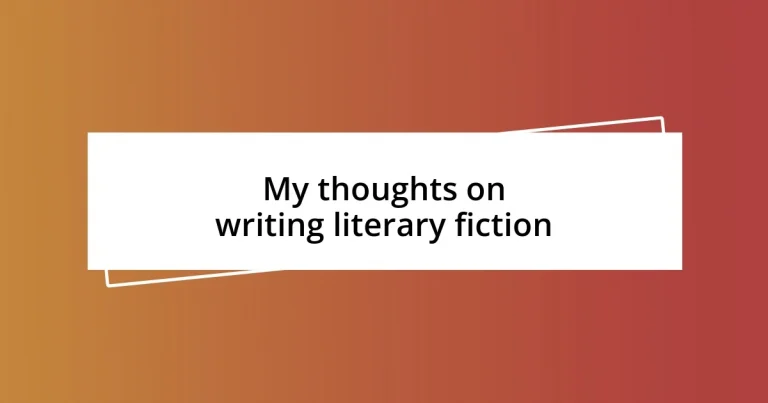Key takeaways:
- Literary fiction emphasizes deep character development and thematic exploration over plot-driven narratives, fostering a strong emotional connection with readers.
- Key elements include complex characterization, thematic richness, and artful language that evokes emotion and imagery.
- Effective writing techniques, such as showing rather than telling and embracing vulnerability, are essential for crafting authentic narratives and discovering one’s unique voice.

Understanding literary fiction
Literary fiction often delves deeper into the human experience, exploring complex themes and emotional undercurrents that resonate on multiple levels. I remember reading a novel that didn’t just tell a story but opened up a window into the characters’ innermost struggles. It left me wondering: isn’t that what we crave in literature—a glimpse of ourselves mirrored in another’s journey?
What makes literary fiction distinct is its commitment to character development and thematic exploration over plot-driven narratives. I’ve found that often the best stories linger in my mind not because of what happened, but because of how the characters felt. This focus can create a profound connection between the reader and the text. Have you ever felt so involved in a character’s life that their joys and sorrows felt like your own?
Moreover, literary fiction frequently challenges conventional storytelling techniques, pushing boundaries in style and form. For instance, I recall diving into a book that played with time and perspective, leaving me both puzzled and fascinated. It made me appreciate how structure can enhance the meaning of a narrative. Isn’t that a thrilling aspect of writing? To experiment and discover new ways to communicate the intricacies of life?

Key elements of literary fiction
Literary fiction possesses several key elements that elevate it above merely telling a story. Characterization is paramount; I remember a novel where the protagonist underwent such a transformation that it left me questioning my own beliefs and values. This kind of depth invites readers to reflect on their lives, fostering a personal connection to the narrative.
Another essential aspect is the thematic richness, often sparking conversations about human nature and societal issues. I once encountered a book that wove in themes of loss and redemption so beautifully that I found myself pondering those ideas long after I turned the last page. Can’t we all relate to moments of loss, and doesn’t literature help us process those universal experiences?
Finally, the language employed in literary fiction can be as powerful as the stories themselves. I cherish moments when an author’s choice of words evokes distinct emotions or vivid imagery. This attention to language elevates the reading experience, making it a sensory journey. Isn’t it fascinating how some phrases can linger in your mind, shaping your thoughts about life?
| Key Element | Description |
|---|---|
| Characterization | Deep and complex character development that fosters reader connection. |
| Thematic Richness | Exploration of profound themes that resonate with the human experience. |
| Language | Artful use of language that evokes emotion and imagery. |

Techniques for effective writing
Effective writing in literary fiction often hinges on the art of showing rather than telling. I recall a particular piece where the author painted a scene with such immense detail that I could almost feel the chill of the wind and the weight of the protagonist’s grief. This technique allows readers to engage with the material on a visceral level, drawing them into the world of the story and encouraging them to interpret emotions and themes through experience rather than exposition.
- **Use sensory details:** Engage the reader’s senses by incorporating sounds, smells, and textures that enhance the setting.
- **Subtext is key:** Allow characters’ true feelings to be revealed through actions and dialogue rather than direct statements.
- **Vary sentence length:** Mix short, impactful sentences with longer, flowing ones to create a rhythm that mirrors the narrative’s emotional tone.
The journey of effective character creation is another cornerstone of literary fiction. I often find myself captivated by characters who are flawed and relatable. In one story I devoured, the protagonist’s insecurities and small victories lingered with me, making me reflect on my own life choices. This deep connection can be achieved by crafting characters with rich internal lives, enabling readers to see parts of themselves within the narrative.

Developing complex characters
When it comes to developing complex characters, I often find that a character’s flaws make them overly relatable. For instance, I once read about a character who struggled with perfectionism, and it struck a chord with me. As I turned the pages, I couldn’t help but see my own battles against self-doubt reflected in their journey, proving that our imperfections tether us to a deeper sense of humanity.
Equally important is understanding a character’s motivations. I remember getting lost in a novel where the character’s backstory unfolded like a delicate tapestry, revealing how their past experiences shaped their current choices. This layered exploration kept me engaged, prompting me to question why they behaved a certain way. Doesn’t it feel satisfying to peel back the layers and understand what’s truly driving a character?
Lastly, creating characters who evolve over time adds richness to the narrative. I think of a novel where the protagonist’s perspective shifted dramatically through their experiences. Every choice they made was a response to their circumstances, making their growth feel authentic and impactful. How often do we witness our own transformation in real life? That mirror between fiction and reality can profoundly connect us, making the characters resonate with our own journeys.

Crafting meaningful themes
Crafting meaningful themes is a nuanced endeavor, and I think it starts with understanding the emotional core of your story. I once wrote a piece that revolved around the theme of loss, and I wove my own experiences into the narrative. By integrating my personal reflections, I was able to create a connection with readers who saw their own grief mirrored in the story. Have you ever noticed how a shared sentiment can make a theme resonate more deeply?
To explore themes effectively, consider how they can be expressed through various elements of the story, including character arcs, dialogue, and even symbolism. I remember using an old, rusted key in one of my stories to represent the protagonist’s desire to unlock their past. It was a small detail, yet it encapsulated the overarching theme of seeking redemption. Have you experimented with symbols in your writing? They can add layer upon layer of meaning without needing to spell everything out.
Lastly, it’s important to remember that a theme should provoke thought and invite interpretation. I once encountered a novel that tackled the complexities of human connection, and it left me pondering my own relationships for days. Isn’t it incredible how a well-crafted theme can linger in our minds? By inviting readers to draw their own conclusions, we can create depth and engage them in a dialogue that extends beyond the page.

Revising and editing your work
Revising and editing your work can often feel like a daunting task, but it’s where the magic truly happens. I remember a time when I submitted a draft that I thought was polished and ready to go, only to realize later that my characters lacked depth. Taking a step back allowed me to see the gaps, and this process transformed my initial vision into something far more compelling. Have you ever revisited a piece only to discover hidden potential waiting to be unlocked?
During the revision phase, I find it helpful to read my work out loud. This simple act can unveil awkward phrases or clunky dialogue that might escape unnoticed in silent reading. Once, while adjusting a scene, I stumbled upon a line that simply didn’t flow. By vocalizing my writing, I could hear the rhythm, making it easier to identify what needed to change. Isn’t it amazing how our ears can guide us when our eyes might overlook errors?
Finally, receiving feedback can be a true game changer. I recall sharing a manuscript with a trusted friend, who pointed out inconsistencies I’d missed for weeks. Their fresh perspective not only clarified my thoughts but also opened up new avenues for exploration in my story. Have you ever been surprised by what others pick up on in your writing? Embracing critique can enrich our work, and sometimes, those outside insights make all the difference.

Finding your unique voice
Finding your unique voice is possibly the most exhilarating part of writing literary fiction. I vividly recall the moment I realized that my style didn’t have to conform to any standard. I was reading a piece by an author who had such an unmistakable rhythm in their prose, and I thought, “Why not let my own quirks shine through?” The way they played with sentence structure inspired me to experiment with my own, which in turn sparked a realization: authenticity resonates. Have you ever felt that spark when you stumble upon something that just clicks?
When I began to embrace my distinctive way of expressing ideas, I often found that my characters came alive in ways I hadn’t anticipated. One character in particular emerged from a place of uncertainty, mirroring my own struggles with self-identity. Writing from that personal experience infused the narrative with a raw, genuine quality that I had previously overlooked. It’s incredible how vulnerability can serve as a catalyst for creativity, don’t you think? I’ve learned that sharing those deeper parts of ourselves can create a bridge of understanding with readers.
Listening to myself and my inner thoughts has also been a crucial step in honing my voice. I remember journaling daily, paying attention to how I articulated my feelings and observations. Oddly enough, it wasn’t just a writing exercise; it became a practice in self-discovery. Each entry revealed patterns in my language and emotion that were distinctly ‘me.’ Have you explored your thoughts on the page? It’s fascinating how that can illuminate what makes your voice truly unique, leading you to craft stories that echo your personal truth.














